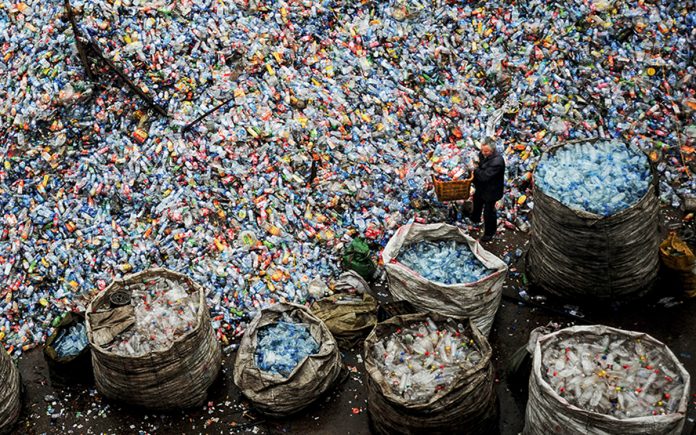For nearly three decades your recycling bin contained a dirty secret: Half the plastic and much of the paper you put into it did not go to your local recycling center. Instead, it was stuffed onto giant container ships and sold to China.
Around 1992, US cities and trash companies started offshoring their most contaminated, least valuable “recyclables” to a China that was desperate for raw materials. There, the dirty bales of mixed paper and plastic were processed under the laxest of environmental controls. Much of it was simply dumped, washing down rivers to feed the crisis of ocean plastic pollution. Meanwhile, America’s once-robust capability to sort, clean, and recycle its own waste deteriorated. Why invest in expensive technology and labor when the mess could easily be bundled off to China?
Then in 2018…China banned imports of dirty foreign garbage. In the United States, the move was depicted almost as an act of aggression. Massive amounts of poor-quality recyclables began piling up at US ports and warehouses. Cities and towns started hiking trash-collection fees or curtailing recycling programs, and headlines asserted the “death of recycling” and a “recycling crisis.”
Well-meaning “apirational” recyclers routinely confuse theoretical recyclability with actual recycling. While plastic straws, grocery bags, eating utensils, yogurt containers, and takeout food clamshells are all theoretically recyclable, they are almost never recycled. Instead, they jam machinery and lower the value of the profitably recyclable materials they are mixed with, like aluminum cans and clean paper.
Contamination [is] also driven by the constantly changing packaging done for marketing purposes by major consumer brands—changes that are often done with little regard for whether the new packaging can be recycled. The Association of Plastic Recyclers called on manufacturers to voluntarily ensure that new packages and containers can be recycled, but a lack of progress on that front has led to legislative proposals in several states.
Today Arkansas, Florida, Illinois, New Jersey, Tennessee, and West Virginia are considering joining the 10 states that already have container deposit laws, a.k.a. bottle bills, which require refundable deposits on all single-use beverage containers (plastic, glass, or metal). Bottle bills are the single most effective means of boosting recycling; it’s no coincidence that the states that have them also lead the nation in recycling rates.
“What this crisis is really about,” says Vinod Singh, outreach manager for Far West Recycling in Portland, Oregon, “is shifting from the artificial situation China created, in which recycling more than paid for itself as a commodity, to the new reality of recycling as a cost.
Analysis:
This piece gives a great overview of key major issues which have been exposed in the wake of China’s national sword policy. All of the points discussed here can be seen as foundational issues in OSU’s recycling system as well, and it gives a good scope of the recycling problems which exist on a national level.




